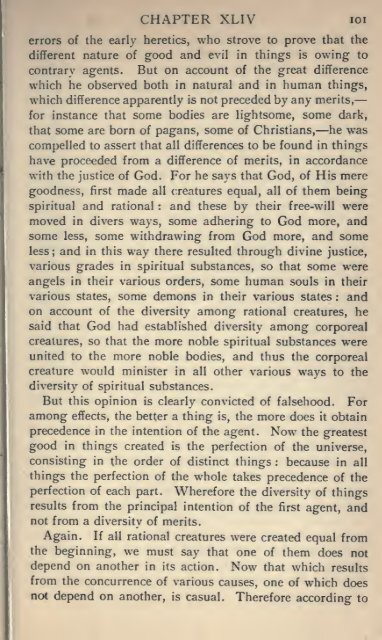summa-contra-gentiles
Summa
Summa
You also want an ePaper? Increase the reach of your titles
YUMPU automatically turns print PDFs into web optimized ePapers that Google loves.
CHAPTER XLIV<br />
errors of the early heretics, who strove to prove that the<br />
different nature of good and evil in things is owing to<br />
<strong>contra</strong>ry agents. But on account of the great difference<br />
which he obser\'ed both in natural and in human things,<br />
which difference apparently is not preceded by any merits,—<br />
for instance that some bodies are lightsome, some dark,<br />
that some are born of pagans, some of Christians,— he was<br />
compelled to assert that all differences to be found in things<br />
have proceeded from a difference of merits, in accordance<br />
with the justice of God. For he says that God, of His mere<br />
goodness, first made all creatures equal, all of them being<br />
spiritual and rational : and these by their free-will were<br />
moved in divers ways, some adhering to God more, and<br />
some less, some withdrawing from God more, and some<br />
less ; and in this way there resulted through divine justice,<br />
various grades in spiritual substances, so that some were<br />
angels in their various orders, some human souls in their<br />
various states, some demons in their various states : and<br />
on account of the diversity among rational creatures, he<br />
said that God had established diversity among corporeal<br />
creatures, so that the more noble spiritual substances were<br />
united to the more noble bodies, and thus the corporeal<br />
creature would minister in all other various ways to the<br />
diversity of spiritual substances.<br />
But this opinion is clearly convicted of falsehood. For<br />
among effects, the better a thing is, the more does it obtain<br />
precedence in the intention of the agent. Now the greatest<br />
good in things created is the perfection of the universe,<br />
consisting in the order of distinct :<br />
things because in all<br />
things the perfection of the whole takes precedence of the<br />
Wherefore the diversity of things<br />
agent, and<br />
not from a diversity of merits.<br />
perfection of each part.<br />
results from the principal intention of the first<br />
Again. If all rational creatures were created equal from<br />
the beginning, we must say that one of them does not<br />
depend on another in its action. Now that which results<br />
from the concurrence of various causes, one of which does<br />
not depend on another, is casual. Therefore according to<br />
loi


















